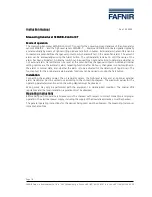
Draft - 1 Aug 08
Pulse Oximetry Measurement
8-6
SpO
2
Monitoring
•
The amount of light passing through depends on many factors, most of
which are constant, such as tissue or venous blood. However one of the
factors, the blood flow in the arterioles, varies with time - because it is
pulsatile.
This measurement principle is used to derive the SpO
2
measurement. The
numeric that is displayed at the Information Center is the oxygen
saturation of the arterial blood - the measurement of light absorption
during a pulsation. Correct placement of the sensor is essential for
accurate measurements (see “Applying the Sensor” on page 8-11).
Note—
Because pulse oximeter equipment measurements are statistically
distributed, only about two-thirds of pulse oximeter equipment measurements
can be expected to fall with
±
A
rms
of the value measured by a CO-oximeter.
Pulse Tone
Indication
During Spot Check measurement initiated at the transceiver, the pulse signal is
detected and communicated to you via an auditory signal at the transceiver. The
indicator is a single low-pitched tone for each pulse detected; it ceases when a
measurement is complete. The tone is controlled by the Volume and Mute
controls at the Information Center.
Since it is possible to have a strong pulse but fail an SpO
2
measurement, you
should listen for the successful completion of a measurement (single beep), or a
double beep if the measurement fails.
The pulse indicator is for information only, and should not be used as an
indication for treatment. The indicator is not functional in Continuous
measurement mode, and no tones, for pulse indication or successful/failed
measurement, are generated when Spot Check is initiated remotely from the
Information Center.
Clinical Note: If the transceiver is in Spot Check mode, and the sensor light is
illuminated but you do not hear a low-pitch sound synchronized with the pulse,
readjust the sensor, or move the sensor to another site to provide better
detection. (Adjustable sounds must be on.)
Summary of Contents for IntelliVue TRx
Page 6: ...Draft 1 Aug 08 About this Book vi ...
Page 40: ...Draft 1 Aug 08 Accessories 2 18 Product Safety ...
Page 54: ...Draft 1 Aug 08 Audible Tones 3 14 Transceiver Controls ...
Page 74: ...Draft 1 Aug 08 Battery Information 4 20 Basic Operation ...
Page 94: ...Draft 1 Aug 08 Technical Alarms INOPs 5 20 Alarms ...
Page 152: ...Draft 1 Aug 08 How the QT Analysis Algorithm Works 7 24 ST AR Arrhythmia Monitoring ...
Page 176: ...Draft 1 Aug 08 Optimizing SpO2 Measurement Performance 8 24 SpO2 Monitoring ...
Page 236: ...Draft 1 Aug 08 Troubleshooting 11 16 Maintenance Cleaning Troubleshooting ...
Page 268: ...Draft 1 Aug 08 SpO2 Accessories A 10 Accessories ...
Page 270: ...Draft 1 Aug 08 B 2 Sales and Support Offices ...
Page 274: ...Draft 1 Aug 08 Index 4 ...
















































